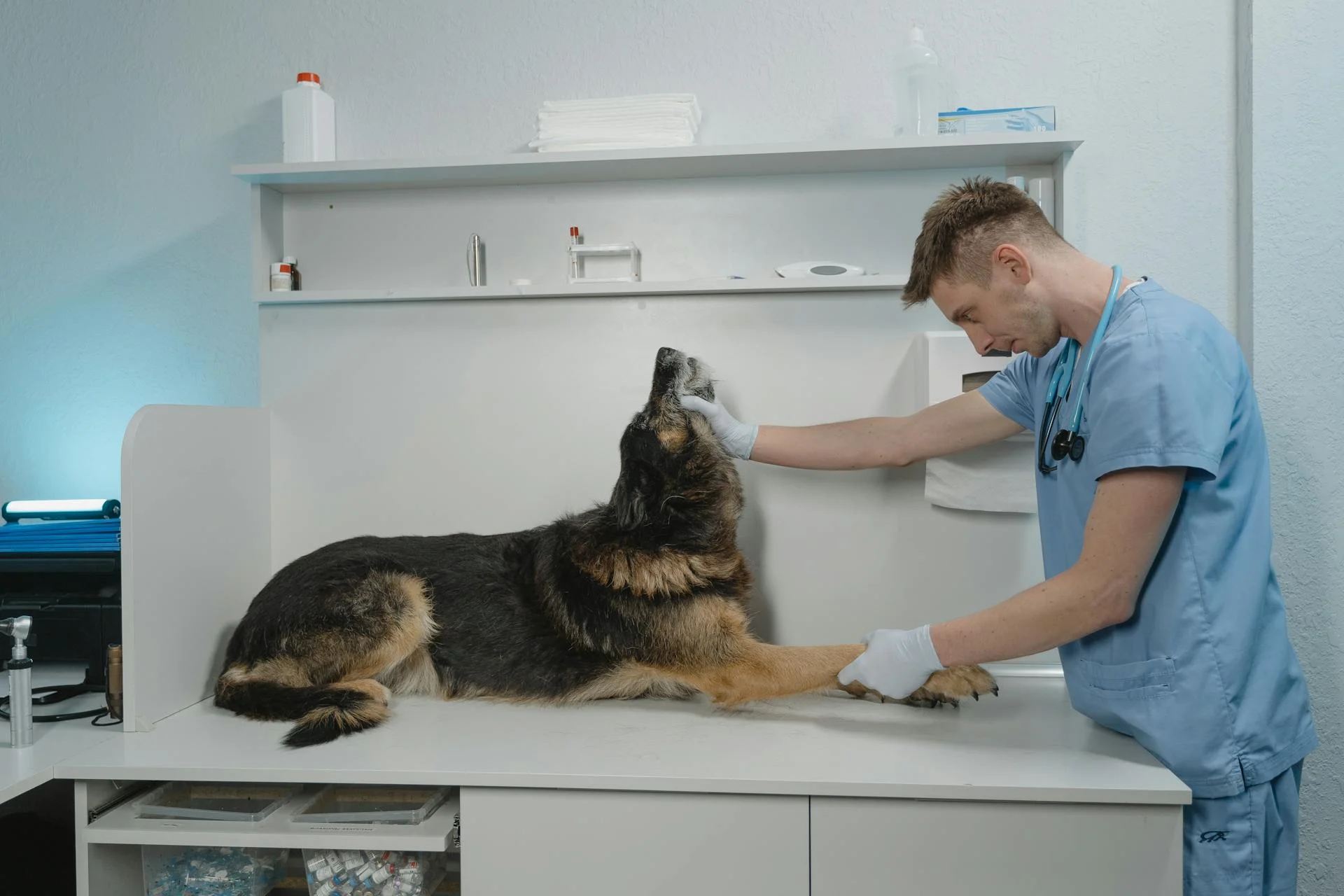
In emergency situations, prompt action can make all the difference in preventing long-term damage from rat poison to your furry friend. If you suspect your dog has ingested rat poison, contact your veterinarian or a pet poison hotline immediately.
The sooner you act, the better the chances of a successful treatment. According to the American Society for the Prevention of Cruelty to Animals (ASPCA), most cases of rat poison ingestion can be treated if caught early enough.
Rat poison can cause severe bleeding, organ damage, and even death, so it's crucial to be prepared and know what to do in case of an emergency. The ASPCA recommends keeping the ASPCA's Animal Poison Control Center phone number handy: (888) 426-4435.
In the event of a poisoning, your veterinarian may recommend inducing vomiting to remove the poison from your dog's system. This should only be done under veterinary guidance, as it can sometimes do more harm than good.
Causes and Symptoms
Most rat poison cases in dogs are the result of unintentional ingestion of bait.
Rodenticides contain dyes that may show up in your dog's stool, and if you see any foreign material, contact your vet immediately.
Clinical signs of rat poisoning vary depending on the type of poison and amount ingested, often taking 1-7 days to show after ingestion of a toxic dose.
Symptoms of anticoagulant rodenticides include lethargy, pale gums, trouble breathing, weakness, and decreased appetite.
Symptoms of cholecalciferol rodenticides are related to the hardening of soft tissues and may include weakness, anorexia, vomiting, increased thirst, and increased urination.
Symptoms of bromethalin rodenticides are related to the effects on the brain and can include lack of coordination, tremors, seizures, and paralysis.
Here are some common symptoms of rat poisoning in dogs:
- Lethargy
- Vomiting or coughing blood
- Nose bleeds
- Bleeding from the gums
- Bleeding when doing the toilet
- Blood in dog poop
- Bruising
- Breathing difficulties
It's essential to note that poisoning can occur from secondary or "relay toxicity" if a dog eats a rat who died from rat poison ingestion, but this has never been documented in research.
Treatment and Recovery
Time is of the essence in treating rat poisoning in dogs. Your vet may induce vomiting and administer activated charcoal to prevent the chemicals from being absorbed into the gastrointestinal tract.
The vet will need to run tests to evaluate toxins that have already been introduced into the bloodstream, especially if you arrived at the vet's office after a delay.
Treatment will vary based on the active ingredient involved, so it's crucial to determine the type of rat poison.
For most active ingredients, the vet will induce vomiting. In some cases, this may need to be done in a well-ventilated area due to the risk of phosphine gas.
After vomiting, treatment will depend on the specific active ingredient ingested. Here's a breakdown of the possible treatments:
• For anticoagulant rodenticide, treatment includes at least 4 weeks of oral vitamin K, hospitalization for IV fluids, plasma, and/or blood transfusions, and additional supportive care.
See what others are reading: Veteran Dog Treats
• For cholecalciferol or bromethalin poisoning, there is no antidote, and hospitalization is likely with IV treatment. Dogs with cholecalciferol poisoning will also be treated to reduce calcium levels, while those with bromethalin poisoning will be treated to decrease brain swelling.
• For zinc and aluminum phosphide rodenticides, antacids and similar medications may be used to decrease the production and effects of the deadly phosphine gas. Liver protectant medicine and medications to treat tremors or seizures may also be needed.
Most dogs will remain hospitalized for observation and treatment for 2-6 days, depending on the active ingredient and how much rat poison was ingested. Blood tests will be performed several times during this period.
See what others are reading: Bromethalin Rat Poison Dog
Emergency and Prevention
Prevention is key when it comes to rat poison and your furry friend. Keep all rat poisons away from your dog and in a secure place.
To prevent rat poisoning, consider using alternative forms of pest control, such as live traps that don't include poisons. Keep a detailed record of how much rat poison was placed, including the active ingredient and take a picture of the ingredients in case of an emergency.
Mark where you dispensed the rat poison and inform anyone who will be caring for your dog about the presence of rat poison. If your dog will be visiting a friend, family member, or sitter, ask if they have rat poison out and keep your dog away from those areas.
Some common rat poisons include bromadiolone, brodifacoum, diphacinone, chlorophacinone, or warfarin, which can impede blood from clotting and lead to internal bleeding. If you suspect your dog has ingested rat poison, call your veterinarian, local poison control center, or veterinary emergency service immediately.
Here are the steps to follow if you suspect your dog has eaten rat poison:
- Call your veterinarian, local poison control center, or veterinary emergency service immediately
- Furnish as much information as possible about the rat poison, including the active ingredient and the amount ingested
- Follow the advice of the veterinarian or emergency service to determine the best course of treatment
Dog Poisoning Emergency
If you suspect your dog has eaten rat poison, don't wait – call your vet or local pet emergency service immediately. This is not an emergency that can wait until morning.
Symptoms of rat poisoning in dogs can vary, but if your dog has eaten an anticoagulant rat poison, they're at risk of internal bleeding, which can be fatal if not treated quickly.
Signs of internal bleeding can include weakness and lethargy, vomiting or coughing blood, nose bleeds, bleeding from the gums, bleeding when doing the toilet, blood in dog poop, bruising, and breathing difficulties.
If your dog has ingested a rodenticide or anticoagulant poison, they risk bleeding internally, which can be fatal, so it requires rapid intervention. Symptoms may not be noticeable until several days after your dog has ingested the poison.
If you suspect your dog has eaten rat poison, it's essential to provide your vet with as much information as possible, including your dog's weight, the day and time of exposure, brand name and manufacturer, active ingredients and their concentration, package size, and approximately how much is missing from the pack.
Here are the key things to note and have ready when you call your vet:
- Your dog's weight
- The day and time of exposure
- Brand name and manufacturer
- Active ingredients and their concentration
- Package size
- Approximately how much is missing from the pack
- Take the packaging with you if possible
Whether your dog has ingested enough poison to kill it will depend on the kind of poison and the quantity. Contact your veterinarian immediately or your local poison control center if you suspect your dog has eaten even a tiny dose.
Prevention

Prevention is key when it comes to keeping your dog safe from rat poisoning. Keep all rat poisons away from your dog and in a secure place.
Consider using live traps that don't include poisons as an alternative form of pest control. This can be a more humane and safe option for both your dog and the rodents.
Always keep a detailed record of the rat poison you've used, including how much was placed and what kind of product it is. Knowing the active ingredient is also crucial in case your dog ingests it.
Take a picture of the ingredients in case you need to refer to it later for veterinarian treatment. This can be a lifesaver if your dog accidentally ingests the poison.
Mark where you dispensed the rat poison so you can easily find it if needed. This can help you remember where the poison is located and how much was used.

If your pet is going to visit a friend, family member, or sitter, be sure to ask if they have rat poison out and keep the dog away from those areas. This can help prevent accidental ingestion by your dog.
Never let dogs eat unidentified objects on walks, as these can include toxins and poisons and be hard to determine after the fact. Always supervise your dog during walks and keep an eye out for any potential hazards.
Monitor your pet's stool carefully, as many rodenticides contain dyes that may be noticeable before severe symptoms begin. Keep an eye out for any unusual colors or patterns in your dog's stool.
Frequently Asked Questions
Can a dog survive rat poisoning without treatment?
Without treatment, a dog poisoned by rat poison is at high risk of fatal internal bleeding. Prompt veterinary care is crucial to prevent this life-threatening outcome
How do you flush poison out of a dog's system?
To flush poison out of a dog's system, a vet may use gastric lavage, charcoal, and colonic enemas to remove the substance, accompanied by IV fluids and pain medication as needed. This treatment aims to quickly and safely neutralize the poison and restore the dog's health.
Sources
- https://vetgirlontherun.com/bromethalin-toxicity-in-dogs-cats-vetgirl-veterinary-ce-blog/
- https://www.vets-now.com/pet-care-advice/dog-ate-rat-poison/
- https://www.gunterpest.com/news/a-guide-to-rat-poisoning-in-dogs/
- https://www.pethealthnetwork.com/dog-health/dog-toxins-poisons/dangers-rat-poison-dogs-and-cats
- https://www.petmd.com/dog/poisoning/rat-poisoning-dogs
Featured Images: pexels.com


